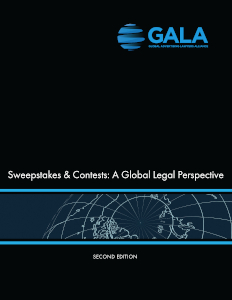Posted by Elena del Valle on December 13, 2021

Michael Harari, Ph.D., associate professor, Management Programs Department, Florida Atlantic University
Photo: Florida Atlantic University
A podcast interview with Michael Harari, Ph.D., associate professor, Management Programs Department, Florida Atlantic University, is available in the Podcast Section of Hispanic Marketing and Public Relations, HispanicMPR.com. During the podcast, he discusses employability with Elena del Valle, host of the HispanicMPR.com podcast.
According to his bio he has published widely in the areas of job performance and performance appraisal, personality, talent acquisition, and careers; and his research has been published in leading academic journals and covered in BBC, Fox Business, Forbes, and Psychology Today. He serves on three journal editorial boards. He partners with organizations from local government agencies to international human resources consulting companies and vendors as a research partner and subject matter expert.
To listen to the interview, scroll down and click on the play button below. You can listen by looking for “Podcast” then select “HMPR Michael Harari, Ph.D.” and downloading the MP3 file to your audio player. You can also find it on the RSS feed. To download it, click on the arrow of the recording you wish to copy and save it to disk. The podcast will remain listed in the December 2021 section of the podcast archive.
Posted by Elena del Valle on December 8, 2021

The Global Advertising Lawyers Alliance’s second edition of Sweepstakes & Contests
Photos: Global Advertising Lawyers Alliance, Frankfurt Kurnit Klein & Selz, Venable LLP, Davis+Gilbert LLP
The Global Advertising Lawyers Alliance (GALA) released a second edition of Sweepstakes & Contests: A Global Legal Perspective (Global Advertising Lawyers Alliance, $99), a 535-page softcover book offering “a detailed overview of the laws governing sweepstakes and contests in more than 70 countries around the world.” The primary target audience for the book? Mainly in-house counsel as well as others working in the area of developing promotions and sweepstakes for their companies, according to a GALA spokesperson. Copies of the digital edition (PDF) are available, as of this writing, free of charge via GALA. Print copies are available via Amazon.

Jeffrey A. Greenbaum, partner, Frankfurt Kurnit Klein & Selz
Three authors were responsible for the seven pages of the United States section: Melissa Steinman, partner, Venable LLP; Joseph Lewczak, partner, Davis+Gilbert LLP; and Jeffrey A. Greenbaum, partner, Frankfurt Kurnit Klein & Selz. In addition to updating existing chapters on legal developments since the first edition was published the new edition has 17 additional countries.
The book is organized in alphabetical order by country. Each chapter summarizes how sweepstakes and contests are regulated in that country. It includes rules, filing requirements, prizes, tax liabilities, and important cases for each country.

Melissa Steinman, partner, Venable LLP
According to Steinman, who responded to questions via email with the help of a GALA intermediary, the most salient issues relating to sweepstakes and contests in the United States in the recent years are, “In the US, like in many/most countries, the biggest issue in sweepstakes and contests in the past couple of years was COVID. The circumstances of the pandemic forced promotion sponsors to face situations where a given travel prize might not be available or a promotion might need to be postponed or cancelled altogether? was legal raised interesting questions about consideration and healthcare privacy. Additionally, ‘Vax Sweepstakes’ became popular as many companies—and even some states—offered vaccine incentive programs in the form of sweepstakes to encourage vaccination. For example, United Airlines’ ‘Your Shot to Fly’ sweepstakes asked entrants to upload proof of vaccination to their United account for a chance to win to win airline tickets, and the state of Ohio offered one million dollars as a prize in its ‘Vax-a-Million Sweepstakes.’ These programs raise unique questions, such as (a) whether requiring a vaccine to participate is consideration; (b) whether the sponsor must allow for exemptions for medical and/or religious reasons; (c) health care privacy issues; and (d) (for employee promotions), potential labor/union issues. The FTC [Federal Trade Commission] also brought deceptive practices actions related to COVID, including promotions: in FTC v. Traffic Jam Events, 2:20-cv-1740 (2020), the FTC took action to halt a scheme by auto dealers that allegedly deceived consumers with ‘prize’ mailers supposedly directing them how to obtain federal COVID-19 stimulus benefits, which instead lured them to a used car sale.
We are also starting to see sweepstakes and contests involving cryptocurrency and NFTs [non fungible tokens]. A class action has been filed against a cryptocurrency exchange platform, Coinbase, over allegedly misleading sweepstakes advertising relating to Coinbase’s Dogecoin Sweepstakes. The complaint alleged that the sweepstakes was advertised in a deceptive and misleading way because the free method of entry was not clearly disclosed in email and website advertising, so entrants believed the only way to enter was by signing up for a Coinbase account and buying or selling $100 in Dogecoin. This is a familiar claim, but a new platform.”

Joseph Lewczak, partner, Davis+Gilbert LLP
According to Steinman, the most notable developments relating to sweepstakes and contests at a global level are “This past summer, Quebec, Canada changed its rule requiring registration of most game promotions. Prior to that, the Régie des alcools des courses et des jeux (Régie) in Quebec, Canada had strict registration and fee requirements that led many promotion sponsors deemed extremely cumbersome to exclude residents of Quebec from promotions. Now, so long as sweepstakes and contests are also open to entrants from outside of Canada and there is no Canada-only prize pool, such promotions are not subject to the Régie’s registration requirements. Note that like all advertising and promotion materials, including rules, must be translated into French for Quebec residents.” And “Additionally, in 2019, Sweden’s new Gambling Act went into force. This law liberalized the rules on lotteries to the point where for the first time, promoters can offer promotional games of chance with no purchase required in Sweden—they were previously prohibited.”
The main difference between the first and second United States editions Steinman explained is that “We have added 17 new countries: Bosnia & Herzegovina, Cyprus, Egypt, El Salvador, Estonia, Ghana, Guatemala, Honduras, Kenya, Latvia, Lithuania, Nigeria, Romania, Serbia, Trinidad & Tobago, the United Arab Emirates, and Zimbabwe. We have added two new questions: Are raffles or charitable sweepstakes regulated differently than prize promotions offered by for-profit corporations? Are there any special rules for chance-based games, skill-based contests or other giveaways based on the audience that may enter (e.g., sweepstakes for children, employee contests, ladies’ night promotions, scholarships offered only to a minority group)?”
According to a recent press release, GALA is an alliance of lawyers located throughout the world with expertise and experience in advertising law. It has members representing more than 95 countries. GALA offers guides to advertising in a number of countries, including Advertising Law: A Global Legal Perspective, Ambush Marketing: A Global Legal Perspective, Privacy Law: A Global Legal Perspective on Data Protection Relating to Advertising and Marketing, and Social Media: A Global Legal Perspective. The organization is planning a webinar, Global Sweepstakes & Contests, moderated by Steinman to highlight key updates in the book, on January 27, 2022.
Comments:
Filed Under: Books














